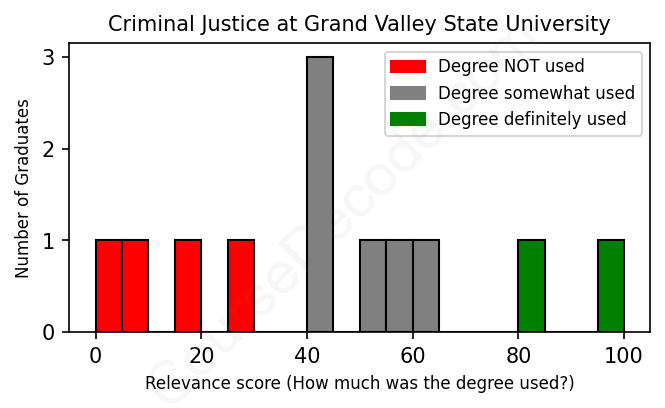
First, some facts. Of the Criminal Justice graduates from Grand Valley State University we've analyzed , here's how many have used (or NOT used) their degree in their career:

These are estimates based on AI analysis of 12 LinkedIn profiles (see below).
The verdict? Bad. Overall, with an average relevance score of 43%, Criminal Justice graduates from Grand Valley State University have a substantially lower likelihood (-24%) of finding work in this field compared to the average graduate across all fields:
And for comparison, here's the chart for all profiles we've looked at across all degrees.
Also, after graduating, only 25% of these graduates have pursued further education other than another Bachelor's degree (such as a Masters degree or other), compared to the average across all profiles of 35%. This suggests a Bachelors degree is enough for most Criminal Justice graduates, and it's normal to look for work straight after graduation.
See the details:
|
Relevance score: 60% We think this person has gone into a career only somewhat relevant to their degree. We think this person has gone into a career only somewhat relevant to their degree.
DEGREE INFOGraduated in 2010 from Grand Valley State University with a Bachelor of Science - BS in Criminal Justice. No other secondary education since. JOB HISTORY SINCE GRADUATIONCertified Nursing Assistant Spectrum Health Aug 2011 - Aug 2014 Responsible Thinking Advisor  Integrity Educational Services Aug 2014 - Aug 2016 Student Advocate  Integrity Educational Services Aug 2016 - Jul 2019 Student Advocate  WYOMING PUBLIC SCHOOLS Jul 2019 - Aug 2022 Procurement Agent & Supply Chain  Apex Spring & Stamping Corporation Jun 2022 - Present ABOUTNo information provided. |
The top 10 most common jobs done by the graduates we've analyzed (ranked most common to least) are:
From the analysis of LinkedIn profiles of graduates from Grand Valley State University with a degree in Criminal Justice, it seems like a sizable number of individuals have taken roles directly related to law enforcement and support positions in educational or social services. Jobs like Police Officer and various Student Advocate roles pop up frequently, showcasing a clear alignment between their education and their career paths. These positions, especially in law enforcement, not only require the knowledge learned during their studies but also allow for the application of those skills in real-life scenarios, which is pretty crucial in the field of Criminal Justice.
However, it's also noticeable that several graduates have ventured into roles that don’t make much use of their Criminal Justice degree, like positions in sales, hospitality, or administrative support. Jobs ranging from servers to clerks often focus on completely different skill sets, meaning a lot of these graduates might not be fully utilizing their educational background. While some found ways to connect their diploma to their job, a fair share of others drifted away from Criminal Justice altogether, which might suggest a limited availability of jobs in the field or a shift in interest after graduation.
Here is a visual representation of the most common words in job titles for Criminal Justice graduates (this is across all Criminal Justice graduates we've analyzed, not just those who went to Grand Valley State University):

Looking at the career paths of graduates from Grand Valley State University with a degree in Criminal Justice, it seems like there's quite a mix of outcomes. Many of the graduates initially land jobs that are related to law enforcement or social services, which aligns well with what you'd expect from a Criminal Justice degree. For instance, some students became police officers fairly quickly after graduating. However, as time goes on—around the 5 or 10 year mark—we see a shift. While some stick to their law enforcement careers, a good number end up in roles that aren't directly related to Criminal Justice, like sales or administrative positions. This indicates that while many do start on a relevant path, transitioning to entirely different fields doesn't seem uncommon.
For those who have been in the field for over five years, we see a lot of movement into different types of roles, frequently in management or other supportive positions in various organizations. Some have even ventured into business ownership. On the flip side, others have strayed further away from their criminal justice roots, landing jobs in customer service or even hospitality. This leads to a rather mixed picture overall: some graduates are clearly thriving in their chosen field, while others have found themselves in roles that seem far removed from their studies. So, if you're considering a Criminal Justice degree, be ready for a journey that could take you in many different directions! It's an important field, but the paths afterward can be as diverse as the people who walk them.
Honestly, the Bachelor’s degree in Criminal Justice at Grand Valley State University is pretty much in line with what you'd expect from a typical college program. It's not the easiest degree out there, but it’s definitely manageable if you stay organized and put in the effort. You’ll cover a lot of interesting topics like law, ethics, and the justice system, which can be really engaging. Sure, there will be some challenging classes, especially if you’ve got to tackle research methods or delve into specific areas like criminology, but overall, it tends to be more straightforward than, say, engineering or physics. Just keep up with your readings and assignments, and you should be good to go!
Most commonly, in the LinkedIn profiles we've looked at, it takes people 3 years to finish a Bachelor degree in Criminal Justice.
Looking at the job paths of these Criminal Justice grads from Grand Valley State, it seems like some are doing okay, while others might not be hitting it big just yet. For example, the police officers probably have steady pay, but unless they move up in rank, it might not be super high. Others, like the person who’s a procurement agent now, might be making decent money, especially if they’re in a good company. Meanwhile, some jobs like assistant roles or working as a cashier just don’t tend to bring in a lot, so they might be struggling to make ends meet. Overall, they’ve got some solid experiences, but it really varies—some are likely making a decent living, while others might still be climbing that financial ladder.
Here is a visual representation of the most common words seen in the "about" section of LinkedIn profiles who have a Bachelor degree in Criminal Justice (this is across all Criminal Justice graduates we've analyzed, not just those who went to Grand Valley State University). This may or may not be useful:

Here are all colleges offering a Bachelor degree in Criminal Justice (ordered by the average relevance score of their Criminal Justice graduates, best to worst) where we have analyzed at least 10 of their graduates: